LIVE MASTERCLASS: 7 Strategies For Parents To Help Your Child Earn $100,000 College Scholarships & Ace The New 2024 Digital SAT. Enroll Free!

Personal Statement Do’s & Don’ts
Your grades and standardized test scores are set by now, so the personal statement is your last chance to add something new to your college applications.
An effective personal statement is well-written, avoids cliches, tells a story about you that shows the admissions committee who you are, and brags a little—but doesn’t show off.
I’ve compiled a list of personal statement ‘do’s’ and ‘don’ts’ to help you as you work your way through your first few drafts.
For even more help with the college admissions process, including boosting that standardized test score, consider taking an SAT prep course or ACT prep course with Prep Expert.
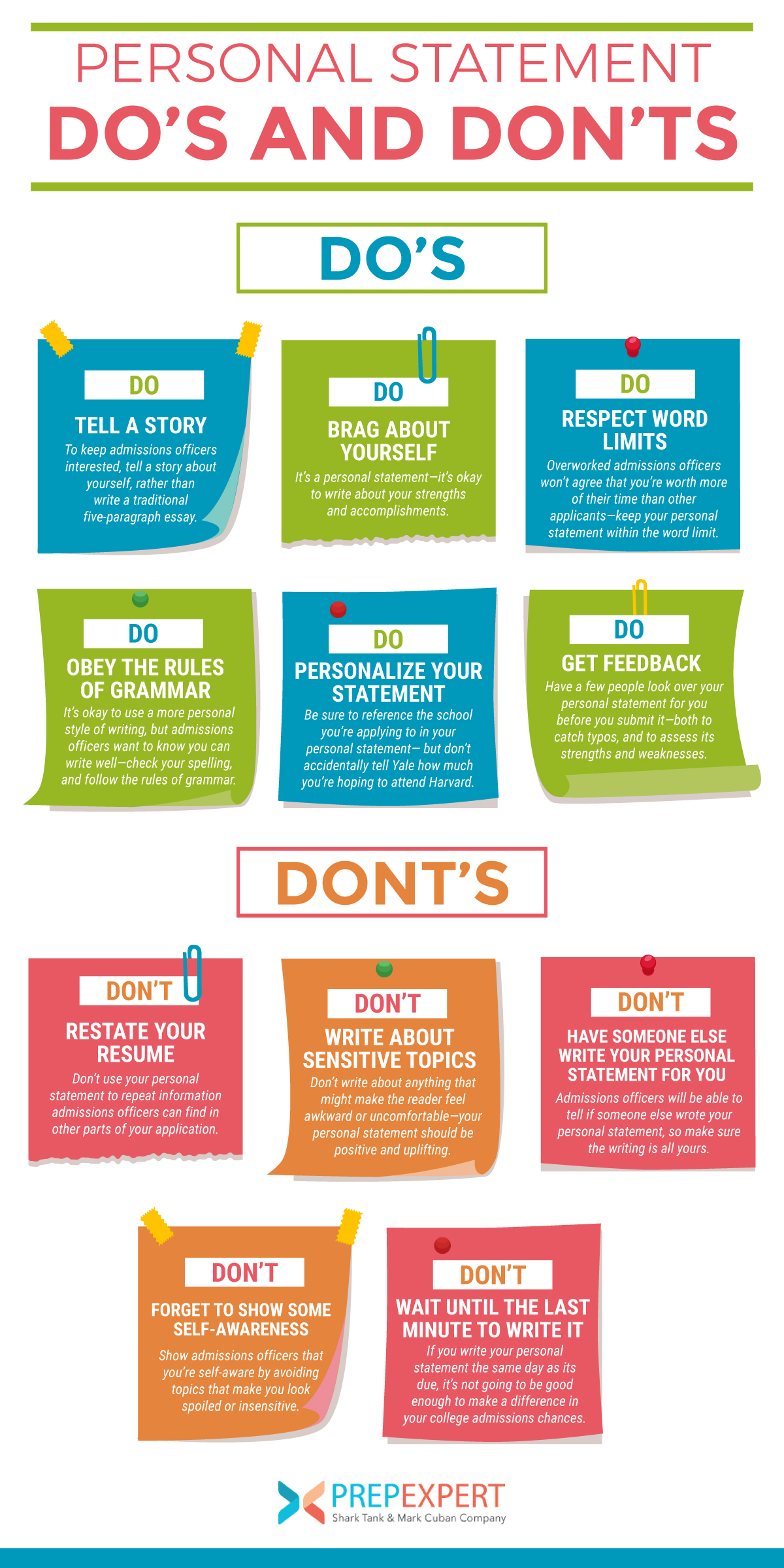
Do Tell A Story
To keep admissions officers interested, tell a story about yourself, rather than write a traditional five-paragraph essay.
Admissions officers read thousands of personal statements every year. You want yours to be compelling and memorable. So, be creative—think about an experience or part of your biography that’s special to you, and write about it.
Avoid topics admissions officers are likely to read about over and over again in other personal statements. Plenty of people have volunteered for Habitat for Humanity or been the captain of their high school basketball team, for example.
Remember, you want to stand out—so, if you do write about something like this, put your own unique spin on it.

Do Brag About Yourself
It’s a personal statement—it’s okay to write about your strengths and accomplishments.
Most people aren’t comfortable bragging about themselves. But that is exactly what to do in your personal statement. Talk about:
- Sccomplishments
- Moments where you made yourself proud
Just be sure to do so tastefully.
How do you strike this balance? Show, don’t tell.
Don’t tell the admissions committee you’re a good person—show them you’re a good person by writing about a good deed that you performed.
Don’t tell them you’re the best basketball player in the state—set the scene and describe how you led your teammates to victory in the championship game.
A good rule of thumb here is to try and use verbs, rather than adjectives.

Do Respect Word Limits
Overworked admissions officers won’t agree that you’re worth more of their time than other applicants—keep your personal statement within the word limit.
Most colleges and universities have a word limit for personal statements. While you might think that you have a particularly compelling story to tell, and need more paragraphs than alotted, don’t give in to this temptation.
Being over by a couple of words isn’t a huge problem—admissions officers aren’t going to count your personal statement word for word—going way over the word limit though will not be a plus for your application.
As mentioned, admissions officers have to read thousands of personal statements every year—so don’t go and give them extra homework.
Besides, you can tell a great story about yourself within the word limit. Being confined to five paragraphs or a couple of pages forces you to write only about the most important and interesting aspects of your story.
If you’re having trouble meeting the word limit, on the other hand, you probably don’t have enough to say about the topic you’ve selected. Go back to the drawing board and try telling a different story.

Do Obey The Rules Of Grammar
It’s okay to use a more personal style of writing, but admissions officers want to know you can write well—check your spelling, and follow the rules of grammar.
Your personal statement is not the place to use slang or casual language. But do show off your command of vocabulary—you want your personal statement to show you’re ready for college-level writing.
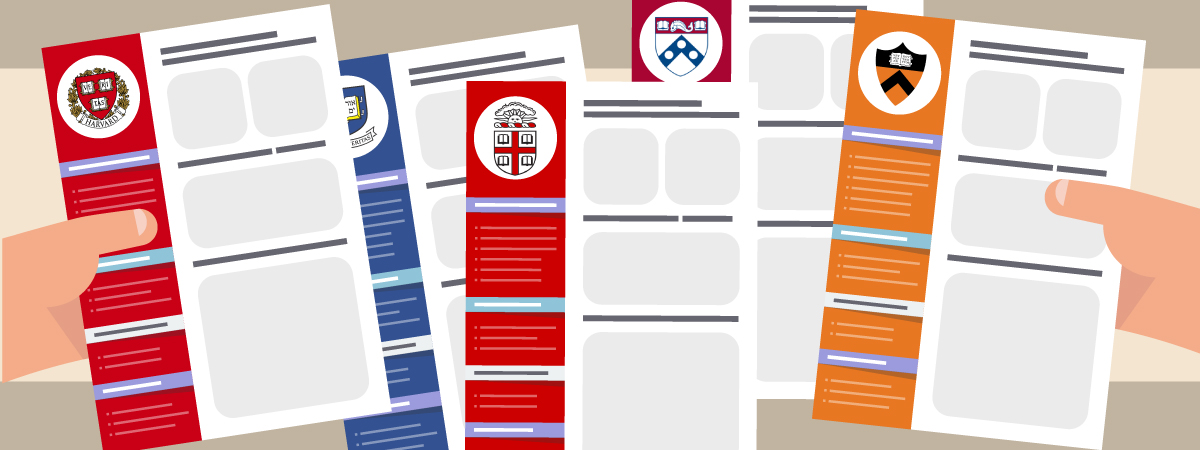
Do Personalize Your Statement
Be sure to reference the school you’re applying to in your personal statement— but don’t accidentally tell Yale how much you’re hoping to attend Harvard.
Even if you’re using the Common Application, you should tailor your personal statement to each school to which you’re applying. Mention the school in your closing paragraph, for example.
It’s fine to recycle the same personal statement for several applications—almost everyone does this—but don’t simply use the find-and-replace function to change the name of the school and be done with it.
Do a thorough once-over to make sure you haven’t accidentally mentioned how much you want to attend Duke in the personal statement you’re sending to Georgetown. (This might seem like a no-brainer, but admissions officials report goofs like this do happen all the time.)

Do Get Feedback
Have a few people look over your personal statement for you before you submit it—both to catch typos, and to assess its strengths and weaknesses.
After all the writing you’ll be doing, you’ll need a few other pairs of eyes to help you see what you’ve been missing. So, once you’ve written a draft of your personal statement, it’s a good idea to show it to others—friends, parents, teachers—and ask their opinions.
Do they think you’ve done a good job introducing yourself to the admissions committee? Did you misspell the college’s name or leave a comma out of place? Let someone else’s fresh perspective tighten up what you’ve put together so far and make it as great as possible.
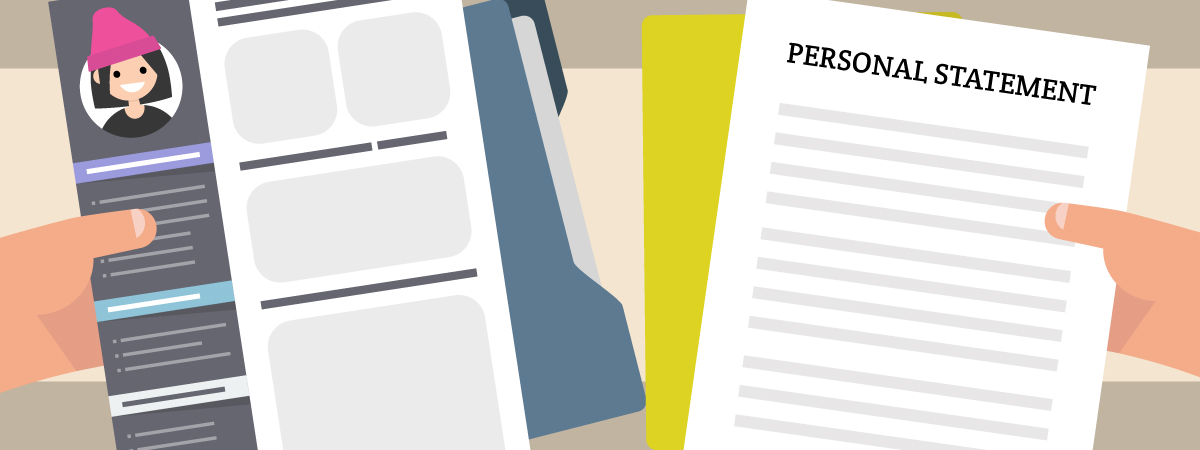
Don’t Restate Your Resume
Don’t use your personal statement to repeat information admissions officers can find in other parts of your application.
You want your personal statement to stand out in a sea of applicants, and you also want to show a side of you that isn’t shown in the other parts of your application. So, don’t make the most common mistake that many applicants make.
That mistake is simply writing a laundry list of your extracurricular activities and academic accomplishments. Admissions officials can already get this information by looking at your application and high school transcript.
[leadmagnet_five]

Don’t Write About Sensitive Topics
Don’t write about anything that might make the reader feel awkward or uncomfortable—your personal statement should be positive and uplifting.
There are certain topics—domestic violence or sexual assault, for example—that might have had a profound impact on your life. You could be tempted to write about these things, to show how you have successfully overcome adversity. Don’t.
Not to downplay these experiences and their personal importance, but these topics, and others like them, are simply too sensitive to write about in a brief personal statement.
It’s not a bad idea to write about how you have overcome adversity, but your personal statement should be positive and leave your reader feeling good, not uncomfortable.

Don’t Have Someone Else Write Your Personal Statement For You
Admissions officers will be able to tell if someone else wrote your personal statement, so make sure the writing is all yours.
This might seem like another no-brainer, but each year, plenty of applicants have someone else write their personal statements for them. These applicants mistakenly think that asking a stronger writer or a native speaker to pen their essay will leave their application in better shape.
However, admissions committees are alert to this practice, and if your ‘voice’ in your personal statement is significantly different from the one in your SAT or ACT essay, admissions officers are going to know they’re not reading your actual writing.
Submitting someone else’s work as your own—better known as plagiarism—is not a good look for your application, and might result in an automatic ding.

Don’t Forget To Show Some Self-Awareness
Show admissions officers that you’re self-aware by avoiding topics that make you look spoiled or insensitive.
Be aware of the advantages you’ve grown up with so far in life. Plenty of students want to write about their life-changing trip to Costa Rica, for example.
But, unless you do so in a way that shows true cultural awareness or engagement with global issues, all you’re really doing is bragging about a really cool vacation that you took.
Unfortunately, that’s not something an admissions officer wants to read about while reviewing a giant pile of applications on their desk.
[leadmagnet_two]
Nor is this type of personal statement likely to reflect well upon you against other applicants, who are writing about topics like being the first in their family to attend college, overcoming an illness, or being an immigrant, for example. Take a minute to think about how your topic choice will come across before writing.

Don’t Wait Until The Last Minute To Write It
If you write your personal statement the same day as its due, it’s not going to be good enough to make a difference in your college admissions chances.
Don’t deprive yourself of the opportunity to write something that’ll catch an admissions officer’s eye, and help you stand out among thousands of other applicants, by procrastinating on your personal statement.
An effective, well-written personal statement takes requires some serious time and thought to do. You should try and get started on it in the summer before your senior year, so when school begins all you have left to do is dot those I’s and cross those t’s.
For more test strategy, college admissions, and scholarship application tips sign up for our FREE class happening right now!
Personal Statement Do’s and Don’ts FAQ
What is a personal statement.
The personal statement is an essay that educates admissions officials about who you are and why you deserve to be admitted to their institution.
What are the elements of an effective personal statement?
How early should i work on writing my personal statement.
You should try and get started on it in the summer before your senior year.
What shouldn’t I do when writing my personal statement?
Don’t restate your resume, wait until the last second, be arrogant, write about controversial topics, or have someone else write it for you.
Related Articles

Why Is The SAT Important?
Dec 17, 2024

How To Get Into Georgetown
Dec 4, 2024

What Are SAT Reading Passages and How to Solve Them?
Nov 26, 2024
Written by Dr. Shaan Patel MD MBA
Prep Expert Founder & CEO
More from Dr. Shaan Patel MD MBA

ACT Test Dates in 2025
If you’re planning on taking the ACT in 2025, you have several dates to choose from. This year, thanks to…
How MIT’s New Free Tuition Policy Is Leading a New Era of American Meritocracy in Higher Education
Massachusetts Institute of Technology (MIT) recently announced an inspiring policy: the school will now provide free college tuition for families…

Hoya saxa! Georgetown University is one of the oldest and most prestigious universities in the United States. The first federally…
BEST ONLINE RESOURCE FOR UNIVERSITY OF CALIFORNIA ADMISSIONS
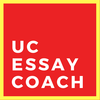
- Academic Preparation
- Extracurricular Activities
- Testing Requirements
- Admission Information
- Essay Ideas
- UC Essay Outlines
- 7 UC Berkeley essays
- USC Sample Response
- UC Essay Questions
- Sample Responses 1
- Sample Responses 2
- Before & After Essay
- Personal Statement Guide
- USC Admission
- UC Santa Barbara
- UC Santa Cruz
- UC San Diego
- UC Riverside
- UC Berkeley
- UC Los Angeles (UCLA)
- Editor Team
- Success Stories
- Testimonials
Copyright © 2016-2021 TopAdmit Education Consulting. All rights reserved.

How to Write a Personal Statement (Tips + Essay Examples)
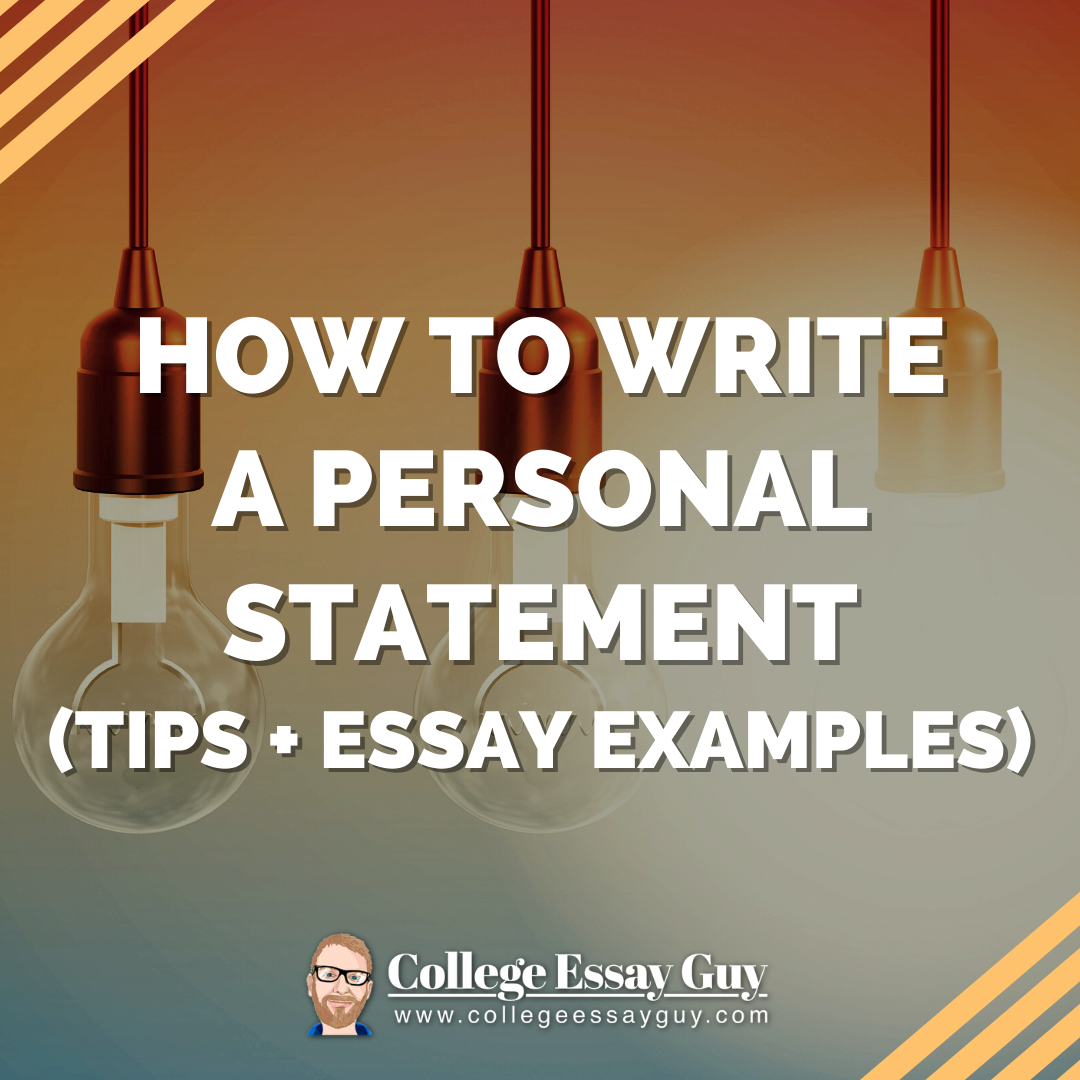
TABLE OF CONTENTS
What is a personal statement that just means “essay” … right, what are some great personal statement topics (aka how do i brainstorm mine).
- Three personal statement examples
A few hundred words to capture who you’ve become over the course of almost two decades?
Yup, makes sense why lots of students find the idea of writing a personal statement intimidating. Framed like the above, it could almost sound, I don’t know, unreasonable.
Whether you’re using the Common Application, the Coalition Application, or a school-specific application portal, it can be scary to try to come up with an essay topic that encompasses the complexity and vastness of who you are as a person … while also staying in the word count.
But this can also be a fun, meaningful experience (real talk: We wouldn’t be doing this if we didn’t think it was true). In fact, the process of brainstorming and writing about meaningful aspects of your life can be an incredible way to practice self-reflection and think more deeply about who you are, what you value, who you hope to be in the world, and what you actually want to get out of college.
So to help you move past the intimidating aspects and focus more on the fun and meaning, in this post, we’ll describe what differentiates the personal statement from other college essays and what function it serves in your college application. We’ll also share what qualities can help a personal statement stand out, how to find a stronger topic, how to set yourself up for an easier writing process, and even share some essay examples we loved.
A personal statement is an essay in which you demonstrate aspects of who you are by sharing some of the qualities, skills, and values you’ll bring to college. A written personal statement is typically used by college admission offices, but it’s also often used by scholarship selection committees or specific academic departments to help assess potential candidates.
To understand what the personal statement is, it’s helpful to imagine your entire college application as a human body. The personal statement is the metaphorical “heart”—it captures the essence of who you are as a person and what motivates you, both academically and personally.
Let’s briefly clarify what it isn’t . It’s not a classic five-paragraph essay you write for English class (thesis, body, restate thesis in almost the same words, but hopefully not repetitively, done).
Here are some other ways a personal statement is different from an English class essay:
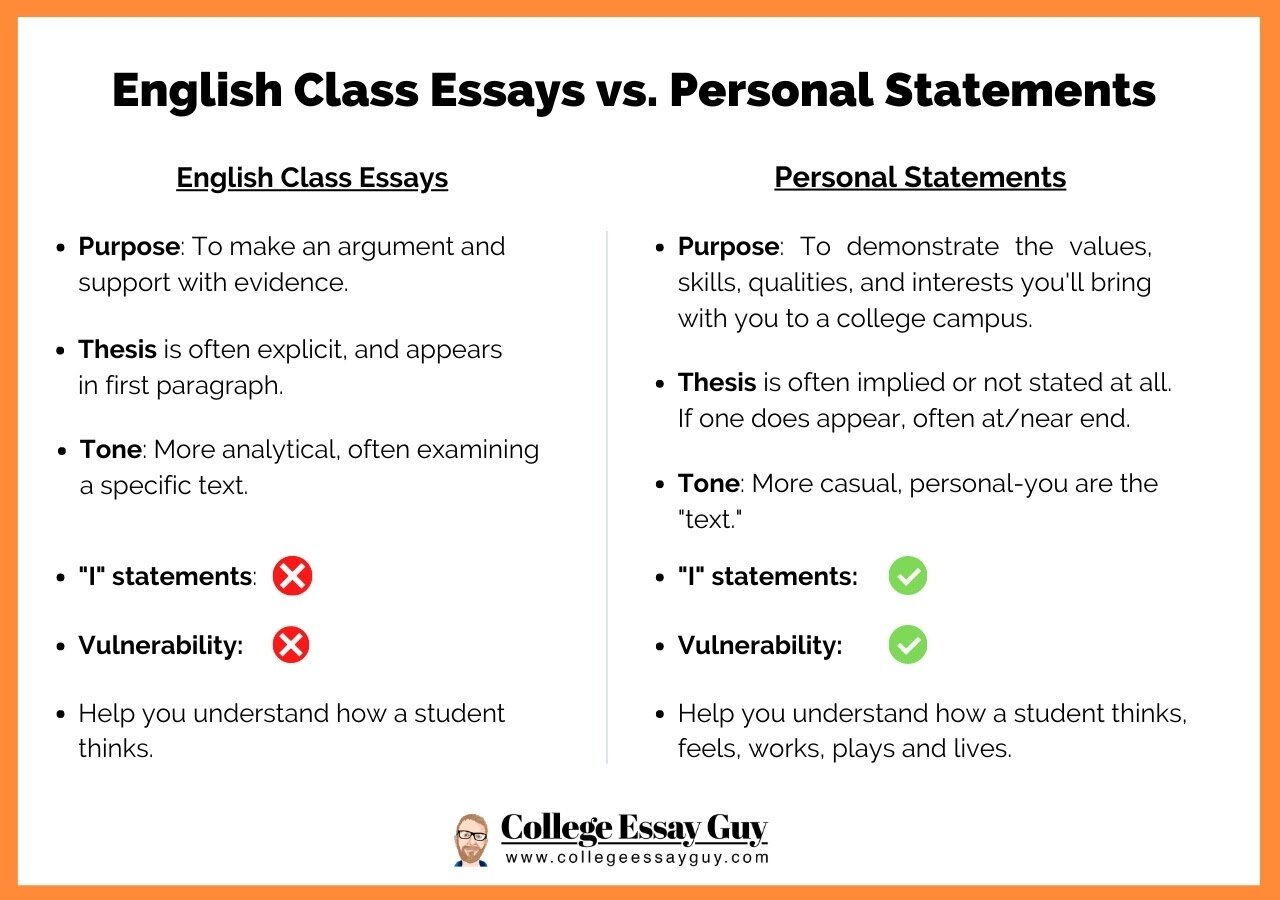
There’s no “right” essay topic to write about, as you’ll see from the range of essay topics in this post . Students have written successfully on topics ranging from: I Shot My Brother, to Home, to Being Pooped on by Animals. Oh, and btw, we’d recommend not reading too many sample essays before you’ve done some brainstorming of your own first. But whatever topic you land on, keep this in mind:
The goal of your personal statement is to find a topic that demonstrates the skills, qualities, values, and interests you’ll bring with you to a college campus.
In fact, though we’ll keep saying “topic” of your essay because it’s clear and easy, the topic of your essay is ultimately always you. Just as the heart drives the actions of the rest of the body, the personal statement provides context for the rest—and, in some ways, is the heart—of your application. The other supplemental essays , if required by colleges, are opportunities to go into more detail about aspects of your interests, passions, and identity not covered in your personal statement.
The personal statement is a great place to discuss critical events or experiences in your life that catalyzed you to become the person you are now, or various aspects of your identity that strongly influence the way you interact with the world around you. It’s also an opportunity to introduce readers to your most important interests and values . For more on that, and exercises to help clarify those things, check those links (we’ll also offer more on them later).
What makes a great personal statement?
Ultimately, there’s no one-size-fits-all approach to writing your personal statement that will magically make colleges admit you.
Bummer, we know.
That said, the best personal statements often share a lot of the same qualities , even when they’re about drastically different topics.
Here, in our opinion, are a few qualities you’ll find in an outstanding personal statement:
You can identify the applicant’s core values. In a great personal statement, we should be able to get a sense of what fulfills, motivates, or excites the author. These can be things like humor, beauty, community, and autonomy, just to name a few. So when you read back through your essay, you should be able to detect at least 4-5 different values throughout. When you look for these values, also consider whether or not they’re varied or similar. For instance, values like hard work, determination, and perseverance … are basically the same thing. On the other hand, more varied values like resourcefulness, healthy boundaries, and diversity can showcase different qualities and offer a more nuanced sense of who you are.
It’s vulnerable. We love when, after reading an essay, we feel closer to the writer. The best essays we’ve seen are the ones where students have let their guard down some. Don’t be afraid to be honest about things that scare, challenge, or bother you. The personal statement is a great space for you to open up about those aspects of yourself. As you’re writing, ask yourself: Does the essay sound like it’s mostly analytical, or like it’s coming from a deeper, more vulnerable place? Another way of asking this: Does it sound like the author wrote it using mostly their head (intellect), or their heart and gut? Remember, this is the “heart” of your application. It’s a place for emotional vulnerability. After reading it, the admission officer should (we hope) feel like they have a better sense of who you are.
It shows insight and growth. Your personal statement should ideally have at least 3-5 “so what” moments, points at which you draw insights or reflections from your experiences that speak to your values or sense of purpose. Sometimes, “so what” moments are subtle. Other times, they’re more explicit. Either way, the more illuminating, the better. They shouldn’t come out of nowhere, but they also shouldn’t be predictable. You want your reader to see your mind in action and take that journey of self-reflection with you.
It demonstrates craft (aka it’s articulate and reads well). While content is important, craft is what’ll bring the best stories to life. That’s why it’s important to think of writing as a process—it’s very rare that we’ve seen an outstanding personal statement that didn’t go through at least 5 drafts. Everything you write should be carefully considered . You don’t want your ideas to come off as sloppy or half-baked. Your reader should see the care you put into brainstorming and writing in every sentence. Ask yourself these questions as you write:
Do the ideas in the essay connect in a way that’s logical, but not too obvious (aka boring)?
Can you tell that the author spent a lot of time revising the essay over the course of several drafts?
Is it interesting and succinct throughout? If not, where do you lose interest? Where could words be cut? Which part isn’t revealing as much as it could be?
If you’ve written a first draft and you’re still not sure whether the essay is what you want it to be, give it to a trusted friend, teacher, or family member and have them evaluate it based on these 4 general criteria. Sometimes, we spend so much time on an essay that it’s useful to get another person’s point of view.
The answer to this question dovetails with the approach you’re taking to structuring your essay, so let’s talk about that a bit first.
And while structure may seem nebulous, offering vast options, you can really boil it down to just two approaches: montage or narrative.
So … what are those? And how can you generate some great content for either structure?
Whether you take a Narrative or Montage Approach to structuring your essay depends on your answer to this question:
Do you feel like you’ve faced significant challenges in your life … or not so much? (And do you want to write about them?)
If yes (to both), you’ll most likely want to use Narrative Structure .
If no (to either), you’ll probably want to try Montage Structure .
The above links dive into greater detail if you’re curious, but essentially, Narrative Structure is the classic story structure, focusing roughly equally on a) Challenges You Faced, b) What You Did About Them, and c) What You Learned. Paragraphs and events are connected causally. (Not casually , btw, but causally—as in, through cause and effect.)
Montage Structure focuses on a series of experiences and insights that are connected thematically (so, for example, 5 pairs of pants that connect to 5 different sides of who you are).
So how does structure play into what makes a great personal statement topic?
We believe a montage essay (i.e., an essay NOT about challenges) is more likely to stand out if the topic or theme of the essay is:
X. Elastic (i.e., something you can connect to a variety of examples, moments, or values)
Y. Less common (i.e., something other students probably aren’t writing about)
We believe that a narrative essay is more likely to stand out if it contains:
X. Difficult or compelling challenges
These aren’t binary—rather, each can be placed on a spectrum.
“Elastic” will vary from person to person. You might be able to connect mountain climbing to family, history, literature, science, social justice, environmentalism, growth, insight … and someone else might not connect it to much of anything. Maybe trees?
“Less common” —every year, thousands of students write about mission trips, sports, or music. It’s not that you can’t write about these things, but it’s a lot harder to stand out.
“Difficult or compelling challenges” can be put on a spectrum with things like getting a bad grade or not making a sports team on the weaker end, and things like escaping war or living homeless for three years on the stronger side. While you can possibly write a strong essay about a weaker challenge, it’s really hard to do.
“Insight” is the answer to the question “so what?” A great insight is likely to surprise the reader a bit, while a so-so insight likely won’t. (Insight is something you’ll develop in an essay through the writing process, rather than something you’ll generally know ahead of time for a topic, but it’s useful to understand that some topics are probably easier to pull insights from than others.)
To clarify, you can still write a great montage with a very common topic, or a narrative that offers so-so insights. But the degree of difficulty goes up. Probably way up.
With that in mind, how do you brainstorm possible topics that are on the easier-to-stand-out side of the spectrum?
Would you Rather watch instead?
Brainstorming your (outstanding) personal statement topic
In our experience, virtually every great college essay comes from good brainstorming. So, early on, stay in exploration mode—we recommend that students outline at least 2-3 different ideas before starting a draft.
Quality brainstorming can reveal great topics that you wouldn’t have thought about otherwise (and that you may not even know you can/are allowed to write about). Also, more on this in a bit, but outlining well is a huge time-saver, as it can help you either build a better first draft or reveal that you may not have as much to say about a topic as you might’ve initially thought.
Here are 5 great brainstorming exercises to get you started:
Values Exercise
Essence Objects Exercise
21 Details Exercise
Everything I Want Colleges To Know About Me Exercise
Feelings and Needs Exercise
That Values Exercise is your cornerstone—those values are what you’ll want to thread throughout your application, regardless of what structure you use in your personal statement.
We’d recommend doing all of those exercises, regardless of which structure you think you may use, as you may find something new in exploring, and many students will have to write a bunch of supplemental essays anyway.
That said, if you’re thinking Narrative Structure may be your thing (as in, you have some strong challenges you want to write about), be sure to spend a nice chunk of time exploring the Feelings and Needs Exercise (linked above), as it can directly lead to a strong outline and first draft.
If you’re thinking montage, think about how things like your essence objects and 21 details may be thematically linked, and how they can connect to your core values and memories. After doing those, you can also check out this list of 21 College Essay Topics and Ideas That Worked to get a sense of some topics that have paid off. We’ll draw your attention to some of the specific examples in the tips below. We’ve seen great montages built around things like:
Identity: This can be anything from sexuality, to culture, to race, to religion. For examples, check out “ My Grandma’s Kimchi ” or “ The Five Families Essay .”
Academic/career interests: This isn’t just a list of your favorite classes or a lengthy explanation of how well you did on that one AP Calculus test junior year. Instead, it’s more of an exploration of your educational interests and a meditation on how that might influence the work you do in the future. For examples, check out “ Why Behavioral Economics ” and “ Flying .”
Meaningful objects: Those “essence objects.” They’re basically just objects that mean more to you because they connect to your values at a deeper level. For instance, maybe you’d choose dumplings because they remind you of family dinners on Chinese New Year and a specific moment when you had to navigate your cultural identity. So, talking about dumplings might give you an entry point into talking about things like family and cultural connection. Doing the Essence Objects Exercise linked above will help you figure out what kind of objects might serve this function in your life. See the “ Happiness Spreadsheet ” essay for an example.
Significant Obstacles or Events: You might choose to write about a struggle you’ve faced or a dilemma that forced you to think more deeply about some aspect of who you are or what you’re interested in. “ The Tally On My Uniform ” and “ Dead Bird ” are two examples.
It’s important to note that some of these topics will likely overlap. You might choose to write about a significant challenge you faced that related to your identity in some way. Or maybe you’ll want to include details about both academic and extracurricular interests. Don’t feel like you have to choose just one. This list is just to give you a sense of what kind of topics you can explore.
How should I write a personal statement?
First, outline.
Seriously? Outline?
To get into just a little more nuance—if you have a ton of time until your deadline, and you don’t mind maybe throwing away entire drafts and starting over, then feel free to just dive in and write.
Otherwise, outline. Doing so will save you time and make your writing better.
So how do you outline?
For a narrative, use the Feelings and Needs Exercise , and build clear bullet points for the Challenges + Effects, What I Did About It, and What I Learned. Those become your outline.
Yeah, that simple.
For a montage, outline 4-7 ways your thread connects to different values through different experiences, and if you can think of them, different lessons and insights (though these you might have to develop later, during the writing process). For example, how auto repair connects to family, literature, curiosity, adventure, and personal growth (through different details and experiences).
Here are some solid example outlines:
Narrative outline (developed from the Feelings and Needs Exercise)
Challenges:
Domestic abuse (physical and verbal)
Controlling father/lack of freedom
Sexism/bias
Prevented from pursuing opportunities
Cut off from world/family
Lack of sense of freedom/independence
Faced discrimination
What I Did About It:
Pursued my dreams
Traveled to Egypt, London, and Paris alone
Challenged stereotypes
Explored new places and cultures
Developed self-confidence, independence, and courage
Grew as a leader
Planned events
What I learned:
Inspired to help others a lot more
Learned about oppression, and how to challenge oppressive norms
Became closer with mother, somewhat healed relationship with father
Need to feel free
And here’s the essay that became: Easter
Montage outline:
Thread: Home
Values: family, tradition, literature
Ex: “Tailgate Special,” discussions w/family, reading Nancy Drew
Perception, connection to family
Chinese sword dance
Values: culture/heritage, meticulousness, dedication, creativity
Ex: notebook, formations/choreography
Nuances of culture, power of connection
Values: science/chemistry, curiosity
Synthesizing plat nanoparticles
Joy of discovery, redefining expectations
Governor’s School
Values: exploration, personal growth
Knitting, physics, politics, etc.
Importance of exploring beyond what I know/am used to, taking risks
And here’s the essay that became: Home
Once you’ve got a solid outline, start drafting. A few really useful things for your first draft:
Don’t worry about word count (within reason).
Don’t worry about making your first draft perfect—it won’t be. Just write.
Don’t worry about a fancy opening or ending.
We’ve seen way too many students not write about the things they need to explore in a first draft because they were worried about word count. If your first draft of a 650-word essay is 800 or 900 words, cool. You’ll have to cut eventually. But that’s the easy part (you generally just hit “delete”).
And it’s actually easier to write a good first draft if you’re not worrying about writing a good first draft. We know that sounds contradictory. But what we mean is that a first draft is good if it gives you a clear sense of where to head with your second and third drafts. That’s its job—to help map where you go next.
Linked to that, a strong opening and ending are things you can more easily develop once you’re clearer on your content and structure. So, for a first draft, if something cool comes to you, great. But if not, don’t let it stop you from drafting.
Jump in and spend some time getting your ideas down on paper. Remember your first draft is just a chance to mess around with different topics and thoughts. It doesn’t have to be anywhere close to perfect. If it helps, just think of it as a brain dump. Once you’ve got all your ideas somewhere, you can start to reorganize and make them more coherent.
Revise (And revise. And revise ...)
Like we said earlier, it’s incredibly rare for an outstanding personal statement to not go through at least 5 drafts. So this is a big part of the process.
To get you started, this guide to Revising Your Essay in 5 Steps will help you create clearer logical flow, as will this breakdown of 9 different ways to effectively transition .
If you want to build a better opening , check out a bunch of options to play with there (we’d recommend experimenting, even if you have something you like—through exploring, you may find something even better).
And if you want to strengthen the ending of your essay , wander over that way.
Additionally, one of the best general tips we can give you as you revise is to read your essay out loud to yourself. And try to read from a total stranger’s perspective.
Reading out loud will help you notice problems you maybe missed when reading it in your mind. And reading from a stranger’s perspective will help ensure you aren’t relying on things in your brain that need to be on the page (but aren’t).
You might also try reading it to a trusted family member, teacher, or friend. They might be able to give you some constructive feedback to make your piece more relatable or accessible for other people. Just keep in mind that some people may have a good sense of what makes for strong writing in general, but not necessarily what makes for a strong college essay specifically.
For more about the essay writing process, check out our Ultimate Guide for writing your personal statement.
Want some guidance on your college applications?
Schedule a meeting to work with my team., three personal statement examples (with analysis for why they worked).
Example 1: "Cheers"
While my friends binge The Office , I’m at home with my favorite family tavern, Cheers . Reminiscing on my first visit five-years-ago, going into my tenth visit, I realize the gang at Cheers is my mirror: they reflect how I’ve grown. Sam Malone. Handsome, charming, ex-pro athlete. When I first met Sam, I had the typical impression: a playboy. However, I now see the real Sam: a compassionate being. Raised in Birmingham, I’ve learned many positive lessons, but there are some lessons I’m ashamed of. Homophobia is still prevalent in Alabama; something platonic as hugging your friend fuels ridicule. There’s an episode where Sam is conflicted after discovering his old best-friend was gay. By the end, he determines that whom his friend loves shouldn’t affect their friendship--a progressive act for 1983. This became personal when my brother came out. I was angered that a society that taught me Southern hospitality tried to teach me to hate one of the people I love most. Sam’s actions taught me who one chooses to love doesn’t change their humanity and encouraged me to promote that view in Alabama. When classmates make homophobic comments, I always bring up my brother and our story. These same classmates are now attending the annual Pride parades, standing up for our friends’ rights. Diane Chambers. Educated, elitist, starving artist. Diane loved the arts and displayed her work proudly, even if her cartoons of people depicted animals. As a kid, my dad attempted to teach me how to draw. These sessions ended in frustration, as I wasn’t able to recreate his work. While I was fascinated by the expression of creativity, I thought, “I’m not talented.” Through Diane’s character arcs, I learned art is not linear; it’s multi-dimensional. Diane would appreciate the discovery of my means of expression: graphic design and programming. I blend the two mediums to create an impactful product. Whether it’s designing and developing an app to battle the Tanzanian Water Crisis, or creating advertisements and social media posts for my internship at a construction-tech start-up, I reveal my vision through my greatest passion: technology. Dr. Frasier Crane. Intelligent, empathetic, scientist. Frasier (we’re on a first-name basis), joined the gang later after falling in love with Diane at a mental health retreat. I first met Frasier when I struggled to fit in with my peers. While I had a passion for STEM and its ability to uncover mysteries of the unknown, my peers had a passion for hating everything academic. While I thought Frasier was super cool, I still called him a nerd. However, watching the way Frasier embraced science gradually allowed me to realize my love for it is something to hone rather than suppress. Eventually, I developed enough confidence to reach out to a professor at the University of Alabama at Birmingham to conduct computational physics research. Over the past three years, I have completed two research projects, currently researching the distinct applications of computer vision, and have become a pioneer within STEM. Inspired by the love for Computer Science competitions, I founded the district’s first CS team. Upon concluding our presentation at the U.S. Capitol, I knew Frasier would be proud. The Cheers gang. I have wondered why I clicked with them so well since we are different people. Sam the jock, Frasier the nerd, Diane the artist, I the awkward teenager. I’ve realized each of them is a part of me. When I face societal pressure, I always learn and overcome. While I’m passionate about science, I also love the arts. Whereas I used to be an antisocial 7th grader, I’m now a senior with great friends and mentors. No matter what I’m struggling with in life, I know I can return to Cheers , where everybody knows your name.
Why this essay worked:
This essay does a great job of using the Montage Structure to incorporate a bunch of different aspects of the applicant’s life into one coherent piece. You’ll notice that they use the TV show Cheers and the characters in it as a clothesline off which to “hang” their interest in computer science and graphic design, LGBTQ+ community allyship, and generally endearing nerdiness. This is a really clever way of bringing together seemingly disparate topics. It doesn’t take itself too seriously but tells a lot about the author and how she thinks. It also gives her a very clear structure for her essay. Each paragraph is devoted to one Cheers character and (more importantly) expounds on the ways the author connects to that individual. The essay has a clear purpose despite lacking a linear narrative.
Also notice that the author doesn’t necessarily have a super clear idea of what she wants to do, career-wise. However, she still incorporates specific details about how she’s synthesized computer science and artistic design in various clubs and events. She doesn’t explicitly have to tell us what her future career is for us to get a sense of what interests she might pursue in college. This is a prime example of how you can write an outstanding personal statement even if you don’t totally know what you want to do in college and haven’t faced a significant challenge.
Example 2:
All that I remember from my childhood are happy memories - of blowing balloons in summer after eating an ice-cone, coming from school to find my favourite snacks lined up on the table, my grandma feeding me with her own hands and never failing to add that extra spoon of ghee (clarified butter) to my rice. My parents shielded us from everything that was bad in this world or could somehow hurt us. They were so protective that I learned to ride a bike on the roof of our three-story house because my parents didn’t think it was safe for me to ride on the road. Even on our roof, a place well within the four walls of our house, I had someone looking out for me. That protective bubble around me finally popped when I was stopped from entering a temple where my family goes annually on an auspicious day. I loved that subtle fragrance of saffron and seeing the beautifully decorated temple with thousands of pilgrims lining up. My grandpa donates a lot there which allows us to enter early in the morning and perform the rituals without the usual crowd. The problem this year was a new rule that prohibited Western clothing. The strange thing was that they didn’t stop male my cousin even though we were wearing the exact same thing, jeans and t-shirt. I wouldn’t be surprised if this happened today but I was then, as I was only in middle school. I hadn’t seen anything like this yet because my family never treated us differently -- we hadn’t previously seen this side of the world. I started trying to learn more about the “real world”, reading more news and participating in intercultural exchanges and debates, anything that would give me more insight. This process of exploring different versions of an event, of noticing how different people might see the same thing, made me more observant. But this also made me think of how others might see me and I became scared of being judged. When I was elected Head Girl this past year, I became even more self-conscious because I was in the limelight -- and everything I would do would reflect on the school. I thankfully realized how irrational my fears were during a hectic Round Square International Conference (RSIC) at school. I was busy heading our student team and managing crises. When a school bought more students than they’d registered, I didn’t have time to think, I had to rely on my instincts and take action. Teachers from across the world praised me; one even said I’d been the soul of our conference. These small but empowering moments have helped me realize that I could trust my decisions, my input counted too. I need to be myself and worry less about what others think. I could have easily changed my clothes that day at the temple but I didn’t because that’s not who I am. There’s always going to be someone who might not approve of what I do and that is all right. I am choosing to attend college in the United States because there I can continue my quest to learn more about the complexities of this world. My family never allowed me to use the public transportation in my city. I understand their concern, but I think it’s time for me to explore outside the safety of home, to ride a bike or take the subway, make my mistakes, and learn my way. At school, I felt like I was in the spotlight yet so invisible mostly because I worried about what others might think. But now I will choose to be visible, choose to be me.
Off the bat, one of the biggest things that stands out about this essay is the level of detail in it. In the intro, the author evokes very visceral images of blowing balloons in the summer, extra spoonfuls of ghee on rice, and riding bikes on rooftops. The more you can drop the reader into your world and engage their senses, the better. You want people to be able to identify with you so that they have a clear sense of who you are as a person. It also helps you stand out. The more specifically you write, the less likely it is that anyone else could have written it. That’s what this whole personal statement thing is all about—showing what you can uniquely bring to the table.
The other great thing about this essay is that it ends in a different place from where it begins. This shows insight and growth. The author goes from questioning her instincts and judgements to seeing her inherent value. She begins to gain confidence and see the positive ways in which she can contribute to the conversations she’s a part of. This transformation is important because it’s a hook that keeps people reading. They don’t know where the essay is going to take them, so they keep reading to see where the author will end up. It also demonstrates the applicant’s growth and ability to self-reflect, which are always great qualities to highlight in college essays.
Example 3:
Apparently, I have a natural “mom vibe.” On my volleyball team, I am team mom in every way. As a natural worrier, I like to make sure that everyone has all of their necessities: knee pads, water bottle, hair elastic, uniform. Did everyone go to the bathroom before leaving on the bus? Did we count to make sure that all fourteen of us are here? Does anyone want an apple slice? Over my many years of playing volleyball, I have learned how to play every position well enough to fill in for any member of my team, whether that’s front, back, libero, setter, or hitter, so that I can always be there for my team in a pinch. A few years ago, I transitioned from looking after only my teammates to also helping actual children. I started volunteering at my former elementary school as a teacher’s assistant. I guide third graders through difficult word problems or sentence structures, sometimes translating the lesson to Mandarin for the Chinese students who are struggling with English. I live for that moment when the impossible suddenly becomes possible and I see a student use what they just learned correctly without any assistance. I love helping kids ask big questions, and think about how to solve them, because it reminds me of how my parents guided me. Ever since I can remember, every time my father and I are alone on a long trip, we ask each other questions and the other has to answer with scientific evidence. Do birds have eyelids? Why is gelatin gelatinous? What does schizophrenia look like in a brain? I love thinking about how things work from the molecular level all the way up to the mechanical level. During a recent internship, I had the opportunity to ask big questions through research, a step beyond the guesstimating I was used to doing in my dad’s CRV. The team I was working with was conducting studies focused on treating alcoholism. My job was to “clean up” the data, or make it more readable. I sifted through spreadsheets, digging for the important data and piecing everything together logically. Knowing that my contribution would have a positive impact on people’s lives was incredibly meaningful. I’ve always enjoyed putting things together like a puzzle. As Chief Layout Editor of my school newspaper, I help my designers compile every edition. Like a real-life game of Tetris, every article must fit perfectly with the other articles around it, lined up into evenly lengthed columns. No matter how much experience a graphic designer has, no one gets all of their articles laid out nicely on the first try. We solve every edition by trial and error, which often results in lots of frustration, but no amount of frustration can surpass the pride and satisfaction once we have all the pages compiled and printed. As a pediatrician, I will be able to strengthen and use all these parts of me. I will have the chance to treat a multitude of illnesses and injuries and problem solve my way through each one. Each day, I will be able to think critically and scientifically to give families possible solutions and peace of mind about their child’s health. I hope to continually expand my knowledge as medicine advances and ask big questions by frequently participating in research. Hopefully I’ll be able to work with a great group of peers in a clinic and in public health. I want to find new solutions to seemingly unsolvable problems, and finally, use all of my skills and qualities to help better the lives of others. Plus, as a pediatrician, I will be able to take care of children who cannot always advocate for themselves, so my mom instinct will be one of my greatest assets.
This is another creative example of how you can go about writing a montage essay. The author uses her “mom vibe” to her advantage and discusses how her interest in attending to the people (and world) around her has influenced different spheres of her life. Notice how well the first line hooks us into the story. It’s short, sweet, funny, and visibly distinct from the denser paragraphs below. When you’re writing, think very carefully about your first sentence and the work it’s doing to rope your reader in. That first sentence is your first impression on readers, so you want it to be a good one.
One last standout aspect of this essay is the way it uses questions. In it, the author poses a lot of big and (oftentimes) unanswered questions. This is great because it highlights her natural curiosity and shows her mind in action. She doesn’t have to answer the questions for them to speak volumes about her personality and interests. Don’t feel like you have to resolve everything neatly by the end of your essay. That would be unrealistic, and ultimately, pretty uninteresting. It’s okay to pose questions for the sake of sheer wonder. In fact, it’s better than okay—it’s great. Nerd out a little. Have fun with it.
With all these writing/brainstorming strategies and example essays, the personal statement shouldn’t feel too intimidating anymore. Now you have all the tools you need to start writing an amazing essay.
Another great read: College Application & Admissions Timeline (AKA What Should I be Doing Right Now?)

17 Things to Include in a Personal Statement for University
In University by Think Student Editor March 7, 2022 Leave a Comment
Writing a personal statement for university is extremely important. It is a students first contact with the university, so making a good first impression is key to try secure a place. For students applying to university from sixth form college, your teachers at college should help guide you through the process, however this article will provide you with many ideas you may want to include in your personal statement. Lets jump into it!
1. Your Interest in the Course
It is important to make your interest in the course you are applying for clear , so that the universities are able to understand that you actually want to study under them. Because studying at uni is so independent, universities want to ensure that all of their students enjoy their courses. Enjoying the course will help their motivation to learn and so are able to work hard in order to graduate.
The first section of your personal statement should be dedicated to the course with an explanation as to why you are excited to study it. This will of course need to be backed up with evidence to prove that you are passionate about the subject and are interested in the content of the course. In doing so, you will convince them that you deserve a place at the university.
2. What Led You To This Course
The people looking at your statement will be able to see your interest in the course by learning why you want to study it. They want to know about you, not about the course.
Have a think and take your mind back to where it all started–was it a trip, an event, or a person who inspired the path you want to take? Be reflective and ensure you give an explanation as to how that led you to apply. Tell the universities your story and allow them to see who you are through your words.
You need to have convincing reasons as to why you want to study the course , it can’t just be a simple explanation of “I enjoy the subject”—anyone can say that, so you need to make them really believe in you.
3. Joint Honours Course
If you are applying for a joint honours course, then you should explain why you want to study the subjects together. You could also give reasons as to how the pair complement each other. Do not forget to mention how the combination of these subjects fit in your long-term plans.
For similar subjects, the connection will be more obvious due to the similarities in the courses. In which case you will find it more straightforward to discuss both subjects throughout your personal statement and also as to why you have chosen to study both. Other subjects will have a weaker connection which may make it harder for you to talk about your interests in both.
I recommend that you focus on one first, then the other, before adding a couple of sentences as to why it is beneficial for you to study them alongside one another. Otherwise, as you discuss the second subject, you could link it back to the first one throughout.
If you are applying for different combinations of subjects or have an application to study only one of the two at some universities, with one in common throughout, it may make more sense for you to focus on that subject .
4. Prove That You’re Passionate
To back up your excitement about the course, you need to provide some proof that you’re passionate about studying it. This can be done by talking about any work experience that has improved relevant skills and affected your opinions on the course in some way.
Another very important thing to mention are key examples of your super-curriculars. This refers to anything you have done outside of school which relates to the course, such as reading books, listening to podcasts and anything else related to the course. Always mention how they helped you to consider something you had not thought of before.
For work experience ideas, check out this article , as you probably still have time to start at a placement so that you can include it in your personal statement.
Never lie about any super-curriculars as they are something that universities will want to talk about if they offer you an interview . This could be done by discussing a certain book which they’ll ask your opinions on so they can understand your thought processes and see your mind work (so to speak).
Universities want candidates who have self-motivation and good critical thinking skills . As I mentioned earlier, university focuses on independent studying, so students need to be able to form their own opinions.
5. Schemes Related to the Course
Although they are linked to super-curriculars, mentioning any higher education taster courses, summer schools or other courses are also vital evidence of your intention to do well at uni .
UniTasterDays is a website which you can use to find courses run by universities in preparation. Simply select the subject area you want to explore, add in your age and let it find you available courses! You can also search by university if there’s a specific one you would like to look at.
Springpod groups different degree taster courses in one place so that you can see whether or not a subject is right for you. You can also search on university websites to directly find out if they are running anything that might be useful for you.
6. Why You’re the Perfect Student for This Course
The next thing that should be included in your personal statement is why you are the perfect candidate that the uni should accept.
If you look through the prospectuses of the universities that you are applying to, you will find that they will outline the values of the students they want . The majority of universities will want students to have attributes like a strong work ethic, enthusiasm to learn and to be able to cope well under pressure.
Each university will have their own priorities about the characteristics they want their students to have, but they all want ideal students. This is something you should bear in mind when writing your personal statement.
7. Interpersonal Skills
Interpersonal skills are important as although you need to be independent, you must also be able to work well with others. By learning how to work alongside people with different personalities, you will build confidence in yourself and know how to deal with people.
To learn more about how to develop your interpersonal skills further, Skills You Need offers advice which is tailored to prospective uni students.
As seen in this study , there are many ‘soft’ skills that are looked for by employers, and this can also be applied to uni students. I recommend you have a look at some of the listed examples that the employers decided were the most important to them.
You can mention these skills when outlining experiences like taking part with the National Citizen Service (NCS) and the Duke of Edinburgh’s Award (DofE) . You could also link them into any work-experience, volunteering, or part-time jobs that you have held.
If you are struggling to brainstorm your skills, then feel free to ask your friends and family! But do not get carried away and quote them (i.e., “My grandmother has told me that I am good at communicating with others.”) as this is wordy, makes you come across as unsure of yourself and seem reliant on others.
8. Academic Skills
Academic success is founded on having the right skills, hence why universities want to ensure that their students have such skills. Some academic skills overlap with interpersonal skills.
Critical thinking is one of the most important skills that you will need when in uni , as it involves your ability to interpret sources of information, irrespective of the subject. The University of Leeds explores this skill in more detail on this page . Although it is something that you will be able to show off in interviews, you may wish to mention or display it in regard to your super-curriculars .
Time management and organisational skills are also very important, especially due to the increase of independence that you will face in the transition to uni. You should give examples of these skills if you have acquired them through specific activities such as running a club or tutoring someone. These skills require planning and demonstrate you are able to handle your time well, which is great to include on your personal statement.
9. Employment Experience
If you have had a job that relates to the course in some way, then you should talk about your experience . You could link it if they are of the same field or perhaps it confirmed your desire to study the course.
Your job might seem unrelated, but if it developed your skills, then it could be a valuable example. Have a good think and list all of the benefits that your job has given you. Go through and decide which of those things will help you to study at university or can be linked to the specific subject in any way.
If you are a mature student who has been working for a number of years, it is also a good idea to address what changed in your life that made you decide to either go part-time or give it up so that you could study at uni. For some people, their decision might be because their employment was not fulfilling for them, but for others they wanted to focus on what they truly love despite having had a good career.
10. Volunteer Experience
Given that you are not paid for volunteering, it is proof that you have gone out of your way to gain some relevant experience . This in turn displays your passion.
Your volunteering could have been organised by you or through your place of education, but are valuable experiences, nonetheless. Some organisations through which you may have volunteered include Project Trust and The Duke of Edinburgh’s Award (DofE) .
If you are writing your personal statement early and have not yet volunteered anywhere, then do not fret as you still have time to find a placement. You could look at volunteering in a local charity shop to develop communication and organisation skills. You could even help out in a primary school, or with a scout troop if you are interested in working with children or in education. Check out The Prince’s Trust for links to various organisations that you can volunteer with.
11. Personal Circumstances Affecting Educational Performance
You should not dwell too long on any personal circumstances that you have had to face in order to avoid looking like you are fishing for a ‘sympathy vote’. However, you must mention any extenuating circumstances which have affected your educational performance . This could include any physical or mental health illness, bereavement, or having to care for a family member.
If you managed to do some studying despite the circumstances, it will also display your determination to succeed.
You do not need to give details about what happened, especially if you do not feel comfortable in doing so, instead be more general and focus on how it affected you and your ability to study.
You can mention any extenuating circumstances in passing to explain grades which have been affected as a result. Your teachers should also mention them in your references to back up what you have said . If you are concerned about how your grades look, have a conversion with your teachers to remind them of the circumstances so that they remember to include it in their references.
12. Your Achievements
Universities want to learn about your achievements, especially any ones which relate to the subject. Regardless of whether it is a personal or academic achievement, ensure that you include it in your personal statement.
Some examples of personal achievements may include: winning a Jack Petchey (Achievement) Award , an award for the Speak Out Challenge , any awards you have gained from ASDAN , charity work and volunteering.
Academic achievements include winning competitions such as the UKMT Senior Maths Challenge , an art competition and the Mother Tongue Other Tongue competition. Further academic achievements could include organising an event and being a prefect or a head student.
However, when going through your achievements, you should ensure that it does not come across as showing off, instead it should have a humble tone as universities are not looking for arrogant students.
13. Hobbies and Extracurriculars
Only talk about relevant hobbies, otherwise they do not add too much to your statement. U niversities do want to know about you as a person, they are far more interested in how well you are suited to the course , even through your hobbies.
You could mention any clubs or societies that you take part in, both inside and outside of your level 3 qualifications (this refers to A-Levels, BTECs and the like).
Try to link your hobbies and extracurricular activities to your course. If an extracurricular activity has added to your skills, then by all means go ahead and mention it! This way you will be able to talk about your characteristics without simply listing them.
Prioritise the extracurricular activities in which you had some sort of official role or responsibility , as they will demonstrate your leadership and communication skills.
14. What Makes You Interesting and Unique
You need to show the universities how you stand out amongst the crowd. You can do this by giving them something to remember you by. Think about what makes you unique. Think outside the box! Remember that admissions tutors read thousands of applications, so you need to stand out from the others.
Quotes can be a powerful tool when used correctly to support something you have said but remember that it is you who they want to hear from, not someone famous. Be careful if using a famous quote as many will be reused by multiple applicants.
When writing your personal statement do not read others as they will influence you and what you produce. Instead find your own voice and let the content flow from your mind alone.
15. General Ability to Fit into Uni Life
Overall, your personal statement should showcase why you will be able to fit into university. This is mainly done by talking about your different skills and of course, your passion for the course you are applying for. You could also mention that you have visited a friend or relative at uni, where you have been able to see what it is really like to study there (but only if this is true).
You can also talk about any societies that you would like to join if you are struggling to find anything to say. Make sure the ones you choose are shared by all of the universities that you are applying to though.
16. Your Ambitions
Your plans for where this course is going to lead you is a key feature that you can include. Do you want to continue on from the course by doing a masters? Or perhaps a PhD? Or maybe you have a job in mind that you want to apply for? Whatever it is, only focus on the more immediate goals and not too far into the future.
Telling them of what you intend to do with the degree will show the universities that you have goals which you want to achieve and that you aim to continue progressing with this subject, even after the course is completed. This way you can convince them of your eagerness to succeed with the course!
I do not recommend that you spend too long dwelling on your ambitions as the universities are most interested in what you will bring to them, not so much what you will do after them. A brief mention of your ambitions will suffice in showing them that you do not just want to do the degree for the sake of doing one.
17. A summary of Everything You’ve Mentioned
One way to conclude your personal statement is to summarise your key points . When doing this, do not repeat things as it will be a waste of time, but find a different way to say what you want to.
Kirsty Wilkinson ( Loughborough University school and college liaison manager) recommends that you “summarise what you are most looking forward to about studying at university [and] why you feel that this is the right course choice for you”. Click here to read more of Kirsty’s comments.
Keep an eye on the word counter when summarising, as you do not want to use up too much of your precious word limit on a summary. If you struggle to work out how to finish your personal statement, check out UCAS’ advice .
A bit of Extra Advice
Although this article aims to guide prospective sixth formers on their personal statements, it does include some points which you should also think about when drafting your personal statement for uni—so check it out!
If you need some more specific help due to your situation in life, look at UCAS’ ‘Need more help?’ section on this page .
Now go and get writing!

IMAGES
COMMENTS
Using AI and ChatGPT to help you with your personal statement; Using your personal statement beyond a university application; Carers, estranged students, refugees, asylum seekers, and those with limited leave to remain; Personal statement guides. Personal statement advice: animal science; Personal statement advice: biology; Personal statement ...
May 2, 2017 · Your grades and standardized test scores are set by now, so the personal statement is your last chance to add something new to your college applications. An effective personal statement is well-written, avoids cliches, tells a story about you that shows the admissions committee who you are, and brags a little—but doesn’t show off.
Writing your personal statement. How to write a personal statement that works for multiple courses; The new personal statement for 2026 entry; How To Write Your Undergraduate Personal Statement; Fraud and similarity; How to start a personal statement: The attention grabber; How to end your personal statement; Introducing the personal statement tool
If you’re applying for deferred entry, do mention your gap year plans if you’ve made a firm decision to take a year out. Most courses are happy for you to take a gap year – but they will want to know how you plan to spend it. 10. Keep it positive It can be difficult to get started with your personal statement, but don’t panic.
Jun 20, 2024 · A polished statement reflects your attention to detail and dedication. Conclusion. Crafting a compelling personal statement is an art that requires careful thought and planning. By understanding the key things to include in your personal statement, you can create a powerful narrative that highlights your strengths, experiences, and aspirations.
Read more: universities explain how to end your personal statement with a bang; 10. Forgetting that the personal statement should be personal. Advice can be conflicting - whether it's from online sources, teachers or tutors. You might be told something that you don't think suits your personality or your statement, and it's fine to disagree with it.
Aug 18, 2023 · 10. Don't think about your personal statement for a whole week. If you followed the advice at the very start of this guide, you’ve started your personal statement early. Good job! There are months before you need to submit it. Use one of these weeks to forget about your personal statement completely. Get on with other things – anything you ...
Apr 2, 2021 · To understand what the personal statement is, it’s helpful to imagine your entire college application as a human body. The personal statement is the metaphorical “heart”—it captures the essence of who you are as a person and what motivates you, both academically and personally. Let’s briefly clarify what it isn’t. It’s not a ...
Jul 30, 2024 · Your personal statement is an opportunity for you to highlight all your experiences, grades, studies, extra-curricular activities and additional projects. When writing about them, you can highlight your efforts and hard work in making the project a success, the reasons why you achieved a certain grade or the hobbies you're proud of.
Mar 7, 2022 · When writing your personal statement do not read others as they will influence you and what you produce. Instead find your own voice and let the content flow from your mind alone. 15. General Ability to Fit into Uni Life. Overall, your personal statement should showcase why you will be able to fit into university.